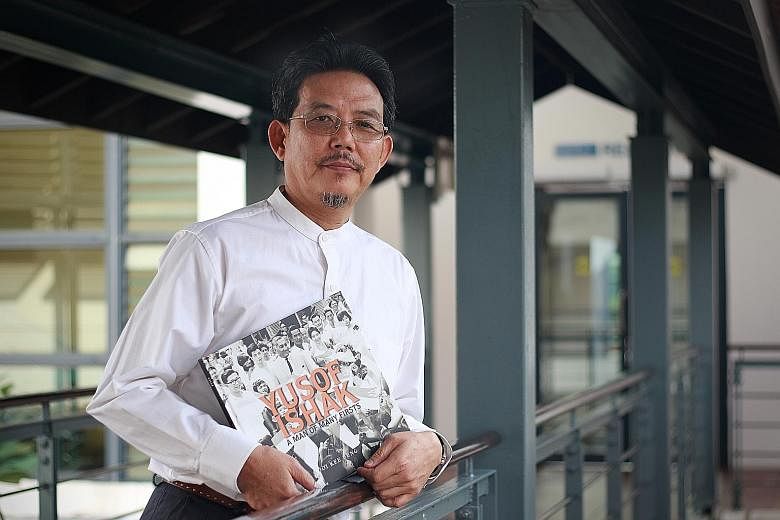As a young boy, Mr Yusof Ishak wanted to be a judge. But his family could not afford to send him to England to study law.
So he imagined becoming a raja, or king, instead, his son Imran Yusof recalls in a new book on his father, who became Singapore's head of state and its first president.
In both roles, he felt he could ensure justice, said Dr Imran, who works at a hospital in Brunei. "He was concerned about justice. A judge metes out justice, likewise a raja should be someone who is in charge and who puts things right."
He added: "(My father) felt that the Malay leaders of the time were dissociated from common people."
This story and other deeply personal details of Mr Yusof's life are featured in a 126-page coffee-table book by ISEAS - Yusof Ishak Institute deputy director Ooi Kee Beng.
Titled Yusof Ishak: A Man Of Many Firsts, it was launched at the think-tank yesterday, at a seminar where Malaysian academic Ahmad Murad Merican - part of Mr Yusof's extended family - spoke on the evolution of Malay journalism in Singapore, and the influence of Utusan Melayu, the newspaper Mr Yusof founded.
The book has more than 100 photos of Mr Yusof and chronicles his life story, from being the son of a civil servant to head of state who would steer Singapore through formative moments of its nationhood.
It also offers little-known snippets about the man, gleaned from interviews with Dr Imran and Mr Yusof's widow, Puan Noor Aishah.
Mr Yusof, for instance, was an avid reader of the works of humorist P.G. Wodehouse. He also listened to Beethoven at home, alongside Malay classics like Dondang Sayang, or love ballads.
Dr Imran also revealed that his father suffered from tuberculosis for most of his adult life, and was a heavy smoker who managed to kick the habit only when he moved into the Istana. These put a great strain on Mr Yusof; he had his first heart failure in 1965 and suffered a few more scares in the years after. Five years later, he died of heart failure in office, at the age of 60.
While Mr Yusof's lasting legacy is that of president of a fledgling multiracial nation, he dedicated most of his life to Utusan Melayu, a Malay-language newspaper that reflected his firm belief in meritocracy and multiculturalism while he remained at its helm.
He was so consumed by his work that, at 39, he was still a bachelor, having rebuffed attempts at matchmaking by friends and colleagues.
When close friends finally convinced him to take a look at photos of potential brides, a glimpse of 16-year-old Noor Aishah was all it took to convince him to travel to Penang, where her family lived.
Puan Noor Aishah recalls in the book that when the newlyweds moved into their first home - in Jalan Ishak, named after Mr Yusof's father, a prominent resident there - it had no piped water or electricity.
After two decades helming Utusan Melayu, Mr Yusof left the paper in 1959, after members of Umno, which wanted special privileges for Malays - a concept Mr Yusof did not believe in - began buying up the bulk of its shares.
He moved to Perak, where he sold orchids, but was eventually persuaded to return by Singapore's founding prime minister Lee Kuan Yew, who first met Mr Yusof when he represented the paper in a case.
In July 1959, Mr Yusof was made chairman of the Public Service Commission. Later that year, he was appointed Yang di-Pertuan Negara, and served two terms as president after Singapore gained independence in 1965. He would play a crucial part in helping to restore the trust of Singaporeans who lived through events such as the 1964 racial riots.
Mr Yusof longed for social equality, and would impress upon his children the value of meritocracy.
Dr Imran recounted: "Every so often he would remind me: 'Everyone should be treated equally. Whatever the colour of one's skin, one should be judged on merit, never on skin colour, race or religion. Anything else is unjust.'"
Dr Ooi said he was struck by Mr Yusof's sense of integrity, pointing out how he decided to leave his life's work rather than be an Umno lackey. He added: "Writing a biography about leaders from the 1960s... is most important for what they tell present and future generations about the times and the historical context in which they functioned."
•Those keen on a copy of the book can e-mail pubsunit@iseas.edu.sg . Copies are available for browsing at the National Library and ISEAS - Yusof Ishak Institute's library.


